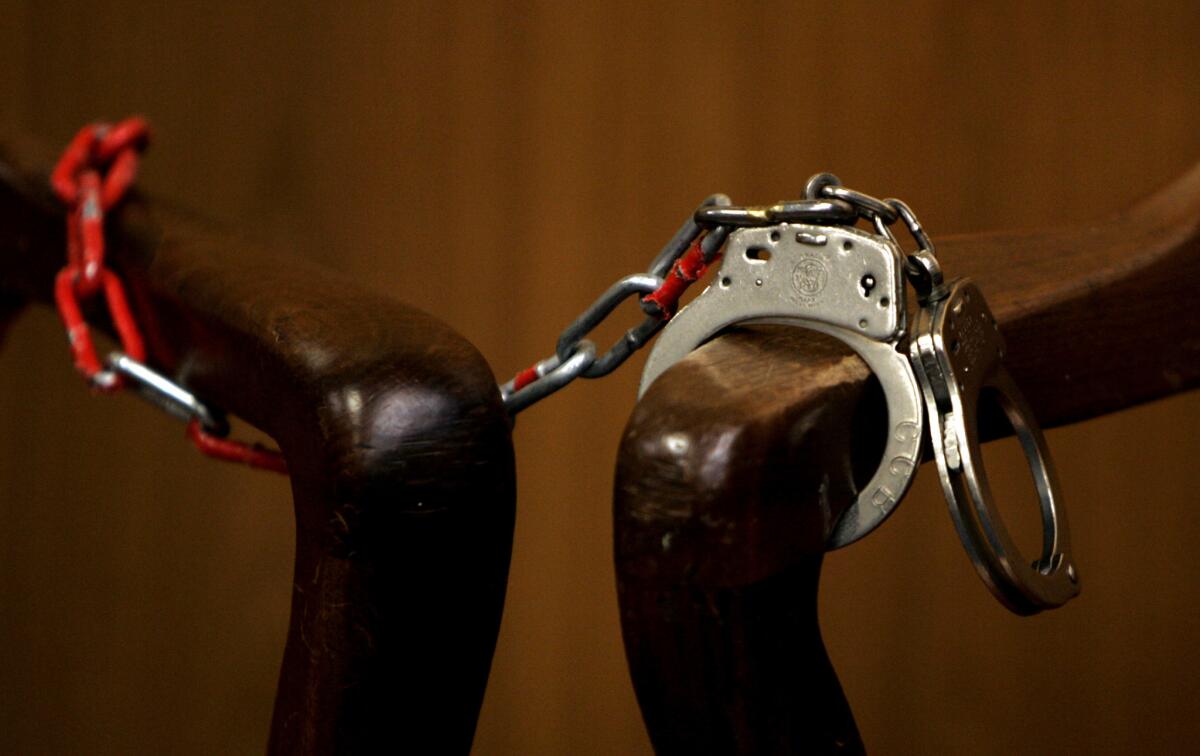The biology of crime: Low heart rate may predict criminal behavior, study says

A new study says that 18-year-old men who had low resting heart rates were up to 49% more likely than their peers to become violent criminals.
- Share via
What if a test could identify young men who were nearly 50% more likely than their peers to become violent criminals? Scientists say they have found such a test – and you can take it with two fingers and a clock.
The test measures your resting heart rate. If you count fewer than 60 beats per minute, you might be physiologically predisposed to commit robbery, assault, kidnapping or even murder, new research suggests.
The idea that there is a biological basis for crime is hardly new, and resting heart rate is one of the leading candidates for linking the two. Studies from more than a dozen countries have found that people with slow-beating hearts are more likely to behave in antisocial ways. However, most of these studies involved a small number of people, and they weren’t tracked for long periods of time.
Researchers from the Karolinska Institute near Stockholm thought they could improve on both those scores by examining decades of data collected by the Swedish government.
Until 2009, nearly all Swedish men were required to undergo a “conscription assessment” for the armed forces when they turned 18. Those records included data on the resting heart rates of 710,264 people – a sample more than 100 times bigger than for all previous studies put together. What’s more, the researchers were able to track these men for up to 35.7 years.
Next, the researchers turned to Sweden’s crime register to see whether any of those people – each identified by a government-issued number – had been convicted of a violent or nonviolent offense after their heart rate was measured. They also examined medical records to see whether the men had been injured or killed in an assault or accident.
When they put it all together, they found that the men with the lowest resting heart rates at age 18 were most likely to commit crimes as they got older, according to a report published Wednesday in the journal JAMA Psychiatry.
The researchers divided the men into five groups based on their heart rates. The 132,595 men in the slowest group registered between 35 and 60 beats per minute, while the 139,511 men in the fastest group had 83 to 145 beats per minute. Although the first group was smaller, it included more men who wound up being convicted of a violent crime. (It should be noted that criminals were the distinct minority across the board – in all five groups, more than 94% of men were never convicted of a violent crime.)
In analyzing the data, the researchers accounted for various factors that might influence the men’s heart rate or their risk for criminal behavior. They controlled for height, weight, body mass index, blood pressure and (when available) the maximum amount of “work” the men could do during an exercise test – all measures related to cardiovascular fitness. They also controlled for each man’s socioeconomic status, IQ and psychiatric health.
When these variables were taken into account, they found that the men with the slowest resting heart rates were 49% more likely to become violent criminals than the men with the fastest resting heart rates. They were also 33% more likely to be convicted of a nonviolent crime, such as a drug or traffic offense.
“The associations were not explained by physical, cardiovascular, psychiatric, cognitive, or socioeconomic factors,” the study authors wrote.
In addition, the researchers discovered that the men with the slowest hearts were 41% more likely than those with the fastest hearts to be injured in an assault and 31% more likely to be injured in an accident.
It’s not clear why a low heart rate would make people predisposed to antisocial – or even criminal – behavior, but scientists have some guesses.
One theory is that men with slower hearts have lower levels of physiological arousal, which they try to boost by doing things that are dangerous or illegal. The other leading theory is that those with slower hearts have a muted response to risky or stressful situations, so they don’t feel the fear that others would.
The fact that men with slower hearts were more likely to get hurt in an accident or in a fight lends support to both theories, according to an editorial that accompanied the study.
“Persons relatively lacking in fear may be more likely to place themselves in risky situations that place them in harm’s way,” wrote Adrian Raine of the University of Pennsylvania, who studies the neurobiological roots of antisocial behavior. “Individuals who impulsively seek stimulation may similarly seek out high-stakes social contexts and make reckless decisions, placing them at risk of being assaulted.”
The study’s results raise a number of thorny and “profound” questions, Raine wrote. For instance, it seems impossible to blame people for their slower heart rates, or for the violence they may endure as a result. “Yet, if we accept this logic, should the legal system in turn accept low RHR (resting heart rate) as a mitigating factor for the commission of serious violence?”
More provocatively, he asked, “Can the criminal justice system continue to turn a blind eye to the anatomy of violence?”
Follow me on Twitter @LATkarenkaplan and “like” Los Angeles Times Science & Health on Facebook.





